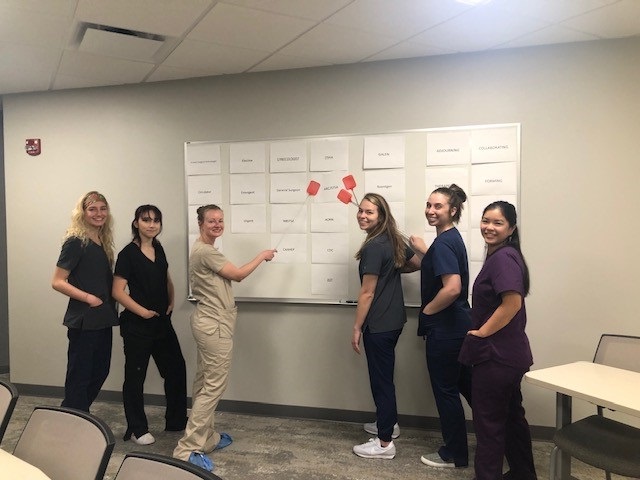By Jennifer Lloyd, BS, CST, Director of Surgical Technology, Trine University
How do we get students out of their seats and actively engaged in the classroom? Most instructors ponder this question for course content outside the laboratory setting.
At Trine University’s Surgical Technology Program, we’ve found that flyswatters are a key to successfully helping student better engage in their learning experience. We have found this common household item to be useful for not only test review sessions, but also for team bonding amongst the students.
The flyswatter activity is used for chapter and test review. We have multiple, large, wall-mounted whiteboards in one of our classrooms. Students form into teams and I tape terms and objectives on each board for the respective teams. Each team gets a flyswatter and they take turns “swatting” the correct answer, which is worth one point.

Students in the surgical technology program at Trine University “swat” at correct answers during this gamified learning exercise.
When we originally purchased the flyswatters, the only ones in stock had an expandable telescoping feature — little did I know how useful that would become! During this period of COVID-19 and social distancing, the activity can still be safely utilized with the swatters in telescoping mode.
The first time this activity is used, students have only been in class together for three weeks. It is quite interesting to watch as they form teams and advance through psychologist Bruce Tuckman’s traditional team development stages of forming, storming, norming, performing and adjourning. Initially, most are hesitant to come together, as they are new to each other. However, it does not take long for competitive natures to emerge, especially when there are potential rewards — bragging rights and occasionally additional grade points — for the winning team. Students look at the activity as a way to earn an extra point or two, but I look at it as a way to begin the process of working in teams. Teamwork is imperative in the operating room and this is one way to encourage that mentality from the start of their education.

Jennifer M. Lloyd, BS, CST, is the director of the Surgical Technology program at Trine University in Fort Wayne, IN. She has worked in surgical technology for more than 30 years. Her career includes tenures at St. Joseph Hospital, Parkview Hospital and the VA Northern Indiana Health Care System in Fort Wayne.
